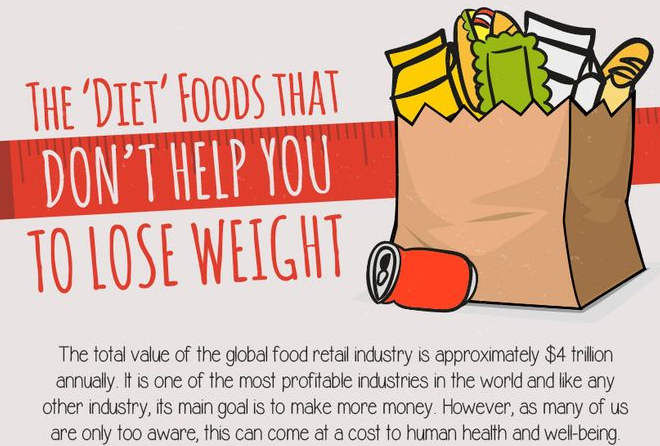Eat This, Not That: 6 'Diet Foods' You Should Avoid If You Actually Want To Lose Weight

Dieting has become America’s pastime, with about 45 million dieters looking to shed the pounds by spending a total of $33 billion on weight loss products every year. Yet, the weight loss market is filled with companies falsely advertising products as “diet foods,” or healthy alternatives to trim the fat. Evoke’s infographic shows how food labels with the words “diet,” “low-fat,” “gluten-free,” “low-calorie,” and “high-fiber” can masquerade as healthy, if dieters don't read the nutrition label and ingredients list.
Drinks that have the word “diet” on the label can do more harm than good when it comes to losing weight. Table sugar is often replaced with artificial sweeteners like aspartame, which ranks 200 hundred times sweeter. These drinks can alter the receptors for sweetness in the brain, and prolong rather than satisfy sugar cravings. Drinking diet soft drinks on a daily basis can also increase risk for metabolic syndrome, which can lead to heart disease and diabetes. On the other hand, drinking a serving of diet soda with water three times a day before meals can lead to weight reduction.
Low-calorie cereal bars may be advertised as healthy, but they often contain just as much sugar as a chocolate bar, as well as refined carbohydrates, which are highly fattening. Consumer research group Which found some cereal bars, but especially those targeting kids, contain more than 40 percent sugar. Don't fall victim to low-calorie labels, and read nutritional labels and ingredients lists to review sugar content. Sugar can be listed as rice syrup, maltodextrin, glucose-fructose syrup, raw cane sugar, fructose, honey, or a mixture of these.
Big food manufacturers have taken advantage of gluten-free foods to sell their products. Gluten-free, highly processed foods, such as muffins and other breads, are actually no better than their gluten counterparts. They are stripped of nutrition and high on the glycemic index, which can contribute to vitamin and mineral deficiencies as well as increase the risk factors for cardiovascular disease and diabetes. Opting for naturally gluten-free foods like meats, nuts, fruits, and vegetables can help reduce gluten intake.
Remember, weight loss does not require the consumption of diet foods. Simply keeping a healthy metabolism and burning more energy than consumed, will help with weight loss.
View the infographic below to see what other diet foods you should completely avoid while trying to lose weight.

Published by Medicaldaily.com



























